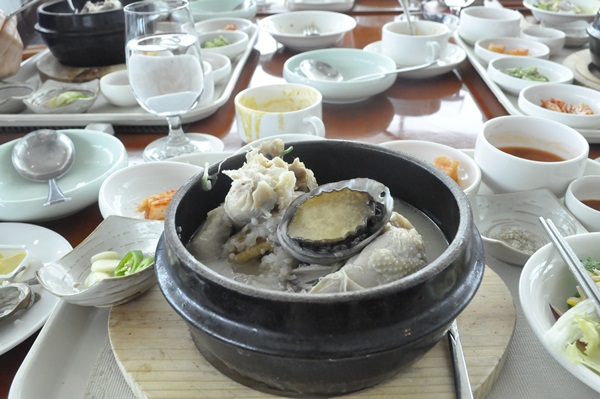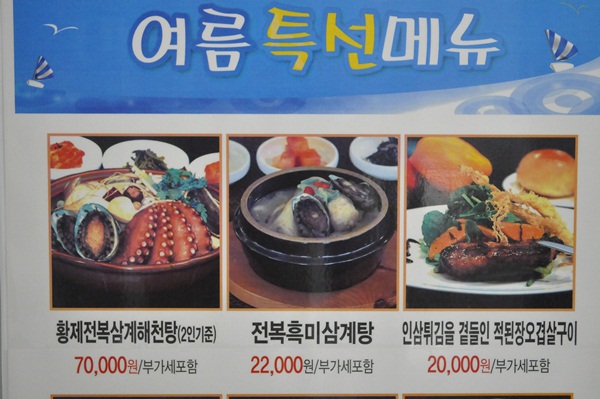| |
 |
|
| ▲ Jeju samgyetang with abalone. Photo by Agne Latinyte |
There are three special days of the Korean summer and on each special healthy foods are traditionally eaten. If you happen to spend at least one summer in Korea you will know that from mid-July until late August sweltering summer heat envelopes the country.
Mainlanders suffer most in their packed cities, especially in Seoul where street temperatures get stuck as high as the skyscrapers and even cooling breezes are absent. Jeju Islanders, however, despite their plentiful wind and refreshing coasts, cannot brag that much under the oppressive heat.
To cope with high summer, Koreans eat healthy dishes on special lunar calendar days. And the dishes are not cold soups or fruity ice creams, but proper hot meals with loads of calories and vitamins. Even the ancient Chinese, a thousand years ago, said it was better to relieve thirst and heat stroke with a cup of hot tea rather than a glass of icy water.
The Koreans call this time “Boknal,” which roughly translated means “the dog days of summer,” when the weather is so hot that it is advisable just to lie down and not move. Boknal originally lasted for thirty days, beginning with Chobok on the 22nd day of the sixth lunar month (this year falling on July 18).
Then there is Jungbok, marking the midpoint of the hottest period, the 2nd day of the seventh lunar month (July 28 this year), and Malbok, literally the tail of summer, the 12th day of the seventh lunar month (August 7).
On these three special days, Koreans traditionally eat either bosintang, the dog stew preferred by the older generation, or samgyetang, a chicken ginseng soup enjoyed more by the younger generation or others who simply prefer not to eat dog meat.
| |
 |
|
| ▲ Delizia's summer menu. Photo by Agne Latinyte |
In ancient times there was also a custom that during Boknal women would eat samgyetang and men would stick to bosintang since it was claimed to provide increased virility. However, both soups are so packed with nutrition that they are good for the health of either sex, regardless.
Samgyetang is widely known for its restorative properties. The dish is prepared by taking a small young chicken and stuffing it with rice, garlic, jujube, ginger, healthy roots, and other herbs. The chicken and all other ingredients are then boiled together and served up in a delicious broth. It is perfect for a sensitive palate, too, as the broth and the chicken are not spicy at all, and most international visitors will be familiar with good old chicken soup.
Among the traditional ingredients of samgyetang, Jeju adds abalone to the broth, thus making the meal even more nutritious. In other Korean regions abalone was expensive an expensive delicacy, perhaps only available for the king’s own samgyetang. But in Jeju, people were more blessed with easy access to the sea creatures so for Jeju samgyetang they are almost a necessity.
There are various restaurants offering Samgyetang around the island but if you happen to be in the southern part of the island, next to Seogwipo City, visiting a convention or an exhibition in ICC Jeju, you shouldn’t miss Delizia restaurant as it offers a well-made, high-quality samgyetang soup with abalone. It is a seasonal dish available until the end of summer, so get down there while you can!
Eating a whole chicken in a hot broth might seem a bit unusual in the extreme heat, but it is founded on the notion of “Yi Yeol Chi Yeol” (fighting heat with heat), as derived from traditional Korean medicine principles. This is seen when people with a fever are kept warm to release the heat and toxins from the body.
So, getting yourself together to endure this hot yet delicious meal at least three times during the hottest days in summer might be surprisingly refreshing and energizing.
Delizia Restaurant
Location: ICC Jeju 3F, 224 Jungmungwangwang-ro, Seogwipo City.
Bus: 780 or 600
Opening hours: 11 a.m. to 8 p.m.
Price: Abalone Samgyetang is 22.000 with an all-you-can-eat salad bar.
Contact: 064-738-6400
|





















